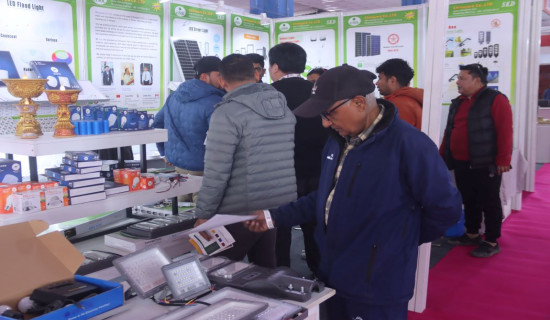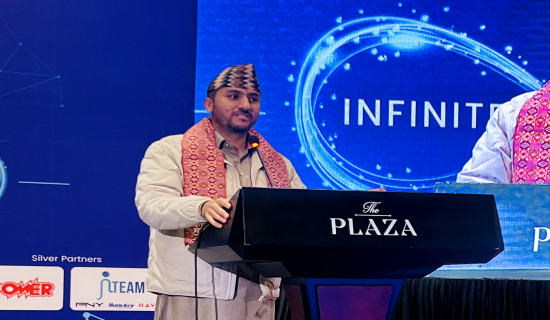- Sunday, 21 December 2025
A Creative Odyssey Of A Civil Servant
Khaga Prasad Nepal, a senior civil servant with long experience in Nepal's bureaucracy and known for his amiable manners and friendly disposition, and a gentleman par excellence—has come out with a very interesting account of things, events, and persons he encountered in his life, including his long innings in Nepal's administration. The book is entitled Meraa Smritikaa Tareliharu, which can roughly be translated as Facets or Layers of My Memory. But as a student of biology, I prefer to translate it as 'Whorls of My Memory.'
Nepal's book has a sentimentally attractive front cover sketched by his grandson, who seems to have a deeper attachment to his grandfather. Divided into seven parts and 71 chapters, the book, a judicious mixture of various episodes of Nepal's administration, a travelogue featuring both domestic and foreign visits, and an assessment of humans the author came across, is a collection of his interesting write-ups, including Facebook posts, and makes a highly readable work with insightful accounts of his early days, long stint in administration, and post-retirement life.
Belonging to the first batch of 1977 as I was to the second batch of the same year, he was 9th in the order of merit among 28 successful candidates, including a lone woman who was asked to join Nepal's civil service. It is an irony of fate or a familiar circumstance in terms of the Nepali context that the author belongs to a class of officers who, despite hard work, dedication to duty, and rich experience in both headquarters and the field, were forced to retire as class two officers. He served under nine ministries and the Public Service Commission and worked as a chief district officer and local development officer and got only one promotion, that too after 18 years in service, in the context of the given situation, while many less deserving individuals rose higher in the career ladders, illustrating the uneven state of the promotion system. They included several secretaries, at least two ambassadors plus one diplomat, one member of the National Planning Commission, and, last but not least, even the Chief of the Commission for Investigation of the Abuse of Authority.
Reading between the lines, Nepal's book highlights an affectionate and deeply existing attachment with his best half, Parbati Nepal alias Paru, as we too hold high respect for the couple for inspiring us in our lives. It also pictures his abidingly deep sense of affection and support for his three lovely daughters and their families. Even otherwise, the author nurtures great respect and attachment with his relatives and friends. Besides, his elder brother, Khem Raj Nepal, who has carved out an impressive image of a top administrator as a secretary with a cerebral bent of mind and a prolific writer, has been a great supplementing factor in shaping his life.
One interesting thing about the author is that he had learned horse riding since his early days before joining the service, as his father owned it. This is to be especially recalled because Indian Civil Service officers supposed to be "heaven-borns" recruited under the British colonial authorities had to mandatorily undergo training for equestrian skills during those days, almost like driving in later years.
The first two chapters of the book are essentially touching descriptions of the demise of his parents, who loved and nurtured him. While he spent most of his life in the civil service, he had shorter stints at primary school, Nepal Rashtra Bank, and Tribhuvan University at the junior levels earlier. His replacement as a primary school teacher, Devi Prasad Ojha, later joined politics and became Education Minister, as politics is possibly an area where one can rise high or even go down in the career graph.
The book portrays the author's friendly disposition, with normally no inclination to blame anyone in his career path. Nepal has, however, categorised the innumerable bosses he served in different classes with both bitter and sweeter comments, including some administrators who denied him grade enhancements. This wonderful book is almost a who's who of the cream of the civil service during his tenure.
Sincere thanks deservedly go to Nepal for being very considerate and kind towards us through Chapter 24, which relates to his transit visit to Dhaka on the way to Bangkok under the title the hospitality of the embassy, as we find few people commending our missions, especially on the part of visitors from other ministries and organisations. Among the diplomats mentioned for appreciation by Nepal in his book are Narendra Bikram Shah, Jitendra Raj Sharma, Dr Shankar Prasad Sharma, Pushkar Man Singh Rajbhandary, and Tara Prasad Pokhrel.
He has named Krishna Bam Malla, a top administrator, chief secretary, litterateur, and ambassador to India who died in harness as Chairman of the Public Service Commission, and Secretary Bhuwan Man Singh Pradhan as model civil servants who saved him from the proverbial jaws of dismissal. This was in the context of marching orders received by many civil servants for their alleged role during the National Referendum held in 1980 as per the announcement of King Birendra to give his people options to choose between the then partyless Panchayat System with timely reforms and multiparty democracy, in which the former got a narrow victory.
Nepal calls Secretary Jagdishwar Upadhyaya an exemplary civil servant in terms of gentle disposition and Secretary Shree Ram Paudel as very simple, refined and cooperative. He refined, Bir Bahadur Shahi as categorisesf the inspirational figures he came across in his long administrative career.
He assesses King Birendra as the most charismatic person in the sphere of our political leadership. Among members of the political brass, the writer greatly appreciates Shailaja Acharya, who became Nepal's first woman deputy prime minister, as a politician who never interfered in the day-to-day administration. He has also named Arjun Rai, President of the District Development Board of Jhapa, as the most dedicated person in terms of local leadership.
On the negative side, the presentation of chapters is not that systematic, organised, or methodical, as the treatment of issues and subjects seems to have been done more on a random basis. Despite such minor lapses, Nepal deserves accolades for his wide-ranging book that is most readable and useful both for civil servants and general readers alike, in view of the comprehensive content of the work.
(Dr. Bhattarai is a former foreign secretary, ambassador, and author.)
















